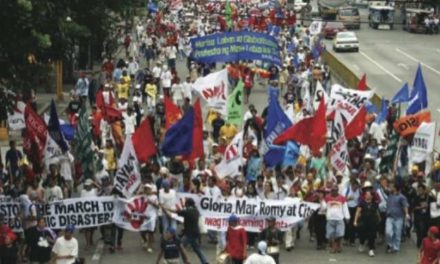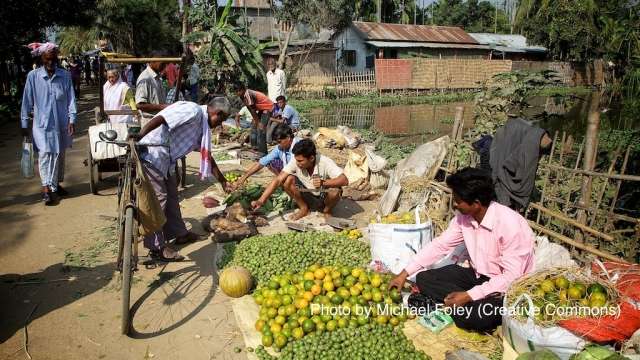By Walden Bello, Focus on the Global South
At a police hearing on Jan 11, the Hong Kong government dropped charges against 11 of the 14 individuals it had detained in connection with the protests at the World Trade Organization Ministerial in mid-December. However, charges of unlawful assembly and unauthorized assembly have been formally made against three of the detainees: Kyung Kyu Yang, a vice president of the Korean Confederation of Trade Unions (KCTU), and In Hwan Park and Il Kwon Yoon of the Korean Peasants’ League.
The three have pleaded not guilty. Their trial has been set for March 1 and 7. In the meantime, they have been released on bail of HK$30,000 each and are allowed to go home before the trial.
Immediately before the police hearing, civil society in Hong Kong was abuzz with activities in support of the 14 activists.
Nightly vigils took place at the Star Ferry Terminal since January 5, when 12 of the 14 began a hunger strike to pressure the authorities to drop all charges and allow all of them to return home. On January 10, over a hundred people from Hong Kong along with about 25 members of an international delegation staged a 24 hour solidarity hunger strike on the eve of a pre-trial hearing on January 11.
Aside from Yang, Park, and Yoon, the other detained activists who fasted for their freedom included eight other Koreans: Dae Hyuk Lim of the Korean Metal Workers’ Union; Dae Sub Hwang of the Korean Catholic Farmers’ Movement; and Seung Kyu Kang, Young Hoon Lee, Suk Namgung, Chang Joon Kim, Dong Ung Han, and Hyung Jin Lee, all belonging to the Korean Peasants’ League. Joining the Koreans was fellow detainee Kosuke Nakagiri, an activist working with the homeless in Osaka, Japan.
Support for the activists has been rising in the city. Aside from attendance at vigils and fasting, acts of solidarity have been shown by, among others, the Hong Kong Professional Teachers Union. The Teachers’ Union donated HK$20, 000 towards the living expenses of the detainees, whose means of existence has been precarious owing to their not being able to return to work in their home countries.
Pressure on the Hong Kong authorities escalated over the past week with protest actions demanding the release of the detainees taking place or planned at the WTO headquarters in Geneva and at Chinese embassies in several cities throughout the world.
Adding to the pressure was the arrival on January 8 of an International Mission of 25 civil society leaders led by three members of the National Assembly of the Republic of Korea: Dan Byung Ho, Ki Kap Kang, and Young Gil Kwon. The mission was organized by Korean groups together with the Hong Kong Confederation of Trade Unions and the Hong Kong People’s Alliance.
At a meeting with the International Mission on Jan 10, five members of the Hong Kong Legislative Council (Legco) announced that they were asking their other colleagues to sign a letter demanding dropping of the charges. According to Legco member Lee Cheuk Yan, “We are asking the Permanent Secretary of Security to drop the charges for three reasons: First, there is little evidence linking the 14 [detainees] to violent acts. Second, this is selective prosecution. Third, the whole case is politically motivated.”
Later that day, a meeting between mission members and the Permanent Secretary, Stanley Ying, produced little positive interaction, with the latter simply saying that his office would make a decision on whether or not to recommend prosecution after the police finished with their investigation. “Under our constitution,” he said, “the Department of Justice will manage the prosecution free from outside interference.”
The antiseptic bureaucratic response, according to some observers, actually hid the Hong Kong authorities’ increasing apprehensions over the case. “The government has a very weak case,” said one Hong Kong activist. The question is why it has allowed things to go this far. Maybe the reason is that it really does not have a foreign affairs office, one that would have looked at the matter and realized all the negative diplomatic consequences for Hong Kong and recommended dropping it.”
Even with the release of 11 of those detained, questions persist as to why the Hong Kong government has decided to continue charging three of them. Some members of the International Mission think that pressure on the Hong Kong government from the World Trade Organization to pursue the case may be one of the reasons.
Other members of the International Mission are Ali Fami, Via Campesina; Balan Nair, Building and WoodWorkers International Union; G. Rajasakaran, International Confederation of Free Trade Unions; Jae Hwan Jeon, Korean Confederation of Trade Unions; Chih-Chieh Tsai, Taiwan Labor Information and Education Association; Osamu Yomono, Japan Railway Union; Hyewon Chong, International Union of Food and Agricultural Workers (IUF); Edgar Bilayon, Alliance of Philippine Workers (BMP); Theodorico Navea, Jr., Freedom from Debt Coalition, Philippines; Kasihiko Sato, Asia Regional Secretary, Public Services International (PSI); Crispin Beltran, Party of the Toiling Masses(Philippines), Jae Hwan Jeon, KCTU; Walden Bello, Focus on the Global South; Max de Mesa, Forum Asia; Young Ie Wuo, Committee for the Action of Labor Legislation, Taiwan; Edwina Antonia, International League for Peoples Struggles; Jong Hwe Lee, Jinbo Network Center, Korea; Min Woong Park and Kyung Sik Moon of the Korean Peasant
League; Suk Chi Soon, International Center for Labor Solidarity; Geun Il Lee, UNI-Korea; and Jae Don Cheong, Catholic Farmers’ Association, South Korea.








